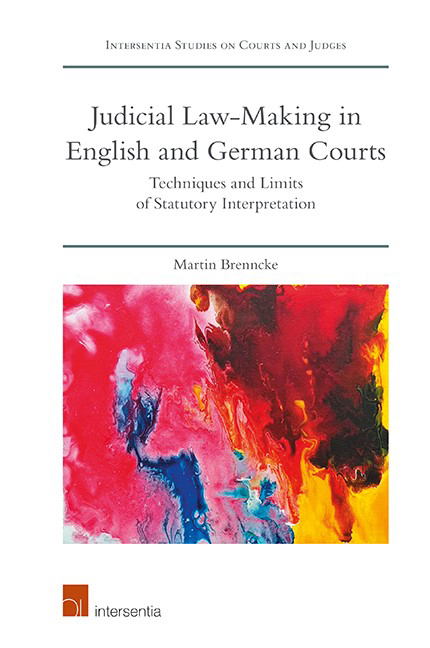Book contents
- Frontmatter
- Dedication
- Foreword
- Preface
- Contents
- List of Case
- List of Abbreviation
- Chapter 1 Introduction
- Chapter 2 Conventional Canons of Statutory Interpretation
- Chapter 3 Rights-Consistent Interpretation
- Chapter 4 The European Legal Duty of Conforming Interpretation
- Chapter 5 Conclusion
- Index
- About the Author
Chapter 1 - Introduction
Published online by Cambridge University Press: 26 January 2019
- Frontmatter
- Dedication
- Foreword
- Preface
- Contents
- List of Case
- List of Abbreviation
- Chapter 1 Introduction
- Chapter 2 Conventional Canons of Statutory Interpretation
- Chapter 3 Rights-Consistent Interpretation
- Chapter 4 The European Legal Duty of Conforming Interpretation
- Chapter 5 Conclusion
- Index
- About the Author
Summary
This book is concerned with the boundaries of what is possible as a matter of statutory interpretation for English and German courts. It is concerned with techniques and limits of statutory interpretation that English and German judges apply when they restrict or extend the scope of application of a provision beyond or against the possible semantic meanings of the statutory language, i.e. when they venture outside the constraints of the text (judicial law-making). The book critically analyses how far English and German judges go in stretching what is possible under the guise of statutory interpretation when they construe national legislation. The interpretative criteria and the specific limits and techniques of judicial law-making as expressed in judicial opinions are ultimately judgemade law in both jurisdictions. The outer interpretative limits and techniques cannot be surpassed by judges without exceeding the judicial function. These limits and techniques aim to prevent courts from claiming powers that are constitutionally reserved to the legislature. They demarcate the border between permissible judicial law-making and impermissible judicial amendment of legislation. This border has often been described as unclear and nebulous in both jurisdictions. The term “ outer limits ” of interpretation refers to all descriptions and methodological elements or items that are used in published written opinions in English and German courts in order to specify this border. For example, judicial law-making in Germany must not disregard the wording and the clearly identifiable intention of the legislature. An English court cannot adopt a meaning that is inconsistent with a fundamental feature of the legislation when interpreting a provision compatibly with Convention rights according to s. 3(1) Human Rights Act 1998 (HRA). In both jurisdictions, it is common for judges to emphasise that they would usurp the legislative function if they relied on their own subjective ideas about policy when interpreting statutes according to conventional canons of construction.
Courts are sometimes accused of an inconsistent approach when determining or applying the outer limits of interpretation. Indeed, judicial opinions in England and Germany that contain insights about the outer boundaries and techniques of judicial law-making are often fragmentary, ambiguous and sometimes inconsistent. That is why this book also aims to reconstruct this fragmentary material into a rational, coherent and systematic whole.
- Type
- Chapter
- Information
- Judicial Law-Making in English and German CourtsTechniques and Limits of Statutory Interpretation, pp. 1 - 48Publisher: IntersentiaPrint publication year: 2018



